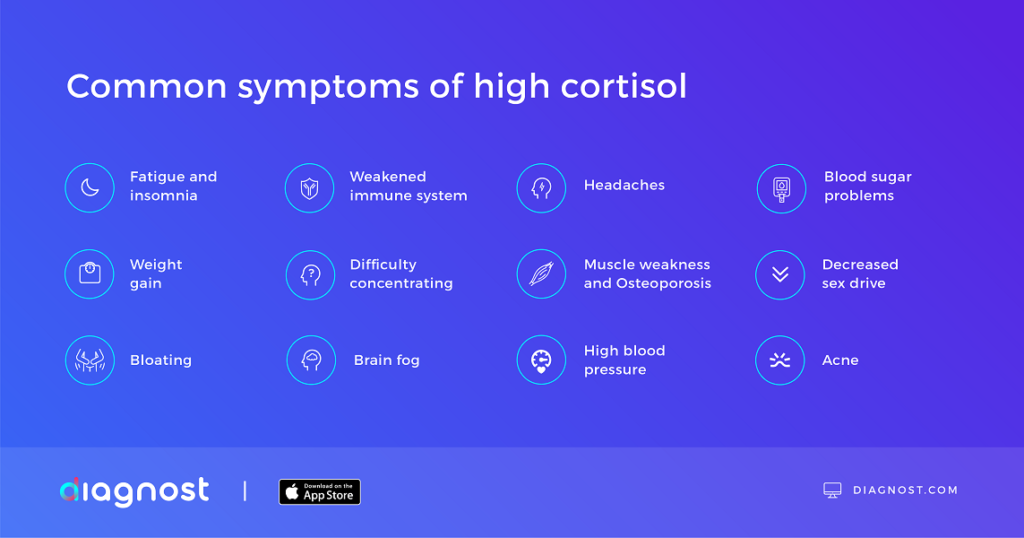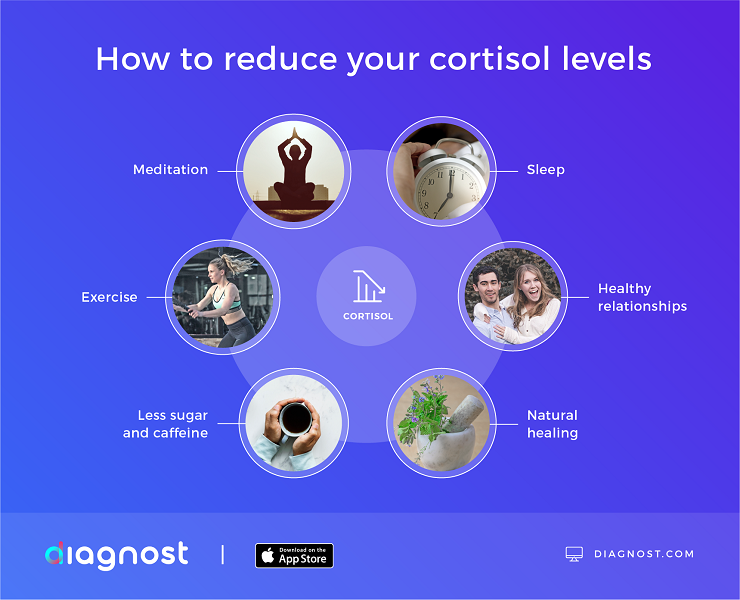How To Reduce Cortisol Naturally In 6 Steps (+Video)
Tatiana Bakunina on June 13th, 2019What is Cortisol?
Cortisol is one of the body’s main stress hormones. It releases when we’re under pressure, causing our evolutionary fight or flight response to kick in.
It is produced by the adrenal gland, and its job is to ensure that your body has enough energy to cope with any danger it believes is at hand. Cortisol narrows your arteries, increases your blood pressure, and raises your blood sugar levels. Historically, it was essential for our survival in the wild, giving us the energy to run for our lives!
However, in today’s world, where perceived dangers are very rarely genuine threats to our lives, the fact that our cortisol levels can spike at the sound of a phone ring or an email notification means many of us are living in cortisol over-drive.
Don’t get me wrong – cortisol isn’t all bad in the modern world. It helps us work hard when we are excited about a project, giving us the drive to stay up late planning, writing and thinking. But like all good things in life, cortisol is good in moderation.
Common symptoms of high cortisol

When you’ve had a few too many hours working overtime, a few too many cups of coffee, (a key corticosteroid) and you start to feel this bloated heaviness, low libido, and depression; when you’re really tired but can’t sleep at night – that all the cortisol effect. Other negative effects of high cortisol on our health include weight gain, blood sugar problems, a weakened immune system and an increased difficulty to concentrate.
But before you get too worried, make sure you check your cortisol levels using a tool such as Diagnost’s home testing kits! You might be totally fine. However, if you find, as many people have, that your cortisol levels are too high then don’t fear – read on for effective ways to lower cortisol in the body.
6 Ways To Reduce Your Cortisol Levels

The good news is that there are lots of easy and enjoyable lifestyle changes that you can make today which will help reduce your cortisol levels! If you truly want to make a lasting impact, it’s best to avoid quick fixes and trust in the power of natural remedies. Below are six key things to focus on. And I bet you’re going to find that they will make you happier and healthier overall, as well as lowering your cortisol levels. So, let’s get started!
1. Meditation

A study at Harvard University shows that meditation and mindfulness practices help reduce stress and anxiety. Meditation is a spiritual practice that dates back thousands of years. However, in today’s world, you don’t need to go to a monastery to feel its benefits in your everyday life. Apps like the wonderful Headspace and Calm offer a variety of types of meditation that you can do whilst walking, sleeping, tidying the house or dozing off. Thousands of people have discovered how meditation can reduce stress through apps like these. Don’t want to meditate alone? Collective meditation groups like Wake Up London might be holding a meditation circle in your local area!
Moreover, since one of the key benefits of cortisol is mental clarity and sharpness, meditation allows also you to reduce stress while also keeping your mind at its sharpest.
In order to start to feel the benefits of meditation, all you need to do is take three breaths, wherever you are. Focus on your in-breath and your out-breath and feel the benefits…
Done it? See – in just a few seconds you become calmer, since you’ve reduced your cortisol naturally!
2. Exercise

Another Harvard study found that “exercise reduces levels of the body’s stress hormones, such as adrenaline and cortisol. It also stimulates the production of endorphins, chemicals in the brain that are the body’s natural painkillers and mood elevators.” They also found that almost any type of exercise can allow you to experience these positive benefits.
However, overtraining and overexerting yourself can actually cause an increase in cortisol levels because of the strain and intensity your body is under. In a recent study, scientists found that cortisol concentrations are higher in endurance athletes than in non-endurance athletes. Another report showed that lower intensity workouts reduce cortisol so significantly that they call yoga an antidepressant!
There is absolutely time for that triathlon, but while you’re trying to reduce your cortisol levels, try gentler forms of exercise like yoga and Tai Chi that enable you to be present in your body, stretch and feel great ahead of a good night’s stress reducing sleep.
3. Sleep

Ahhh, sleep. One of the great joys of life. Cortisol is important for this wonderful bodily function too!
Cortisol levels naturally drop after sunset, helping give your body the signal that it is time to rest. The levels of cortisol remain very low throughout the night, then in the morning, they begin to rise again, helping you have the energy to wake up and face the day. However, when your cortisol levels have been too high in the day this natural system gets thrown out of balance. When this is the case, cortisol levels do not properly drop during the night. This means you might struggle to get to sleep and feel rested the next day.
Sleep is one of the most powerful, yet delicate, bodily systems we have. In his new book ‘Why We Sleep’ neuroscientist and psychologist Matthew Walker writes that it can take our bodies up to two weeks to get over a sleepless night. He recommends that sleep should be prescribed like medicine. Certainly, if your ailment is caused by surges in cortisol, sleep might be the very best prescription a doctor could give!
4. Watch out for sugar and caffeine

Sugar and coffee, like cortisol itself, cause spikes in your energy levels that you pay for later. The problem is that when people are suffering from high levels of stress and struggling to sleep (see above) they often turn to sugar and caffeine to give them the energy they need to cope with the demands their busy day. Unfortunately, this locks people in a vicious cycle. If any of this sounds familiar to you, it’s probably time to take a break and recharge. Find a time when you can carve out at least three days where your only plan is to rest and reboot.
Switching coffee for tea and sugar for honey will go a long way in helping reduce your cortisol levels. Better still – next time you go for coffee break why not try a turmeric latte. Turmeric is an anti-inflammatory herb that can help reduce cortisol levels – and they’re delicious too!
5. Maintain Healthy Relationships

Healthy relationships with family and friends have been shown to have significant effects on cortisol levels. Your beloveds are there to support you and remind you that you don’t need to take on life’s stresses alone.
In a series of studies, scientists showed how different types of relationships affect cortisol levels. One set of findings showed that children with a stable and warm family life have lower cortisol levels than children from homes with high levels of conflict. Another study found that romantic partners that leveraged mindfulness and nonjudgmental-awareness practices during a conflict saw quicker returns of cortisol to healthy levels after an argument. A third study showed that affectionate interactions with a partner before a high-pressure event can significantly reduce cortisol as well as slowing heart rate and easing blood pressure.
Spending time with loved ones, aside from being one of the most important things in life, will also ease your cortisol levels, allowing you to feel stress-free and relaxed.
6. Natural Healing

Natural therapies like acupuncture and massage can also go a long way to relax the body and mind. Acupuncture uses needles to release pressure points in the body, allowing for the easing of bodily and muscular tension, and promoting overall health and wellbeing.
Supplements like Ashwagandha, Holy Basil (Ocimum tenuiflorum), Rhodiola Rosea and reishi mushroom all help reduce inflammation, lower blood sugar and pressure. They have been used for their antidepressant effects too.
Aromatherapy is another powerful method that is easy to do at home. Why not get a diffuser and buy some relaxing essential oils like lavender, frankincense and myrrh? Treat yourself like a newborn king!
Time spent walking in nature also deliver you to a sanctuary of calm. Indeed, studies have connected lying down on the natural ground to reduced cortisol levels. On your rest days, why not make some time to lie down on the natural earth and meditate? If you are lucky enough to live near a body of natural water, submerging yourself below ground level can leave you feeling both grounded and refreshed.
Conclusion
The wonderful thing about embarking on the journey of lowering your cortisol is that the result is a more relaxed mood and an improved sense of wellbeing. That means if your quest for lower cortisol ever feels stressful, you aren’t doing it right! The main thing you should take from this article is the importance of self-care. Looking after yourself, and keeping an eye on what is going on inside your body using Diagnost’s home testing kits will keep any negative symptoms at bay. As they say, “prevention is the best cure”.
In the modern world, stressors are constant. Our evolutionary response systems, rooted in fight or flight, make us feel like things are a matter of life or death. But we’re not at risk – it’s just another day. Therefore, the true challenge of modern life isn’t discovering how to motivate yourself or fire up your energies, it’s learning how to really relax.
It’s time to start focusing on what really counts: mediation, sleep, our loved ones, and our health.
Happy cortisol lowering!



